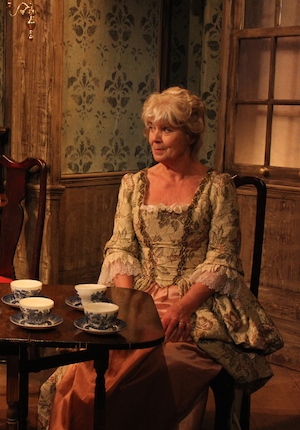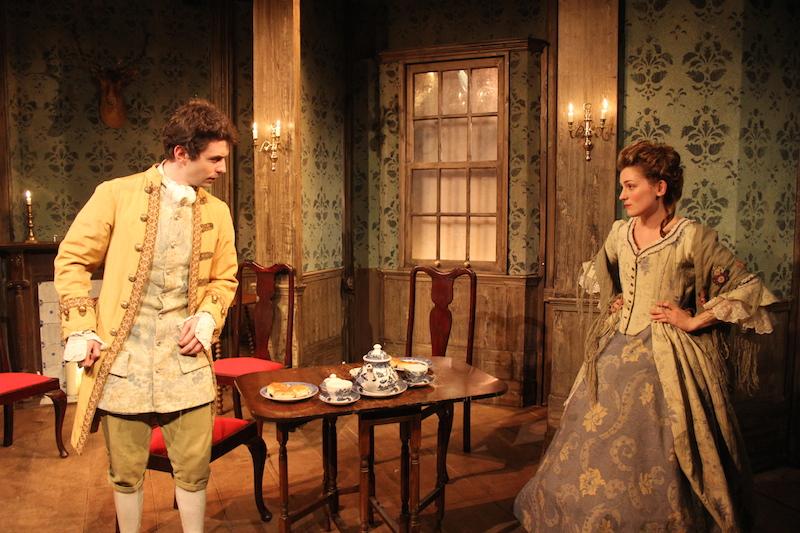There are 15 characters in Robert McLellan's quirky 1948 comedy, but the star is the language most of them speak. To mark the referendum later this month, the Finborough is mounting a season of Scottish work, including a trio of classics, under the title "Scotland Decides 2014/Tha Alba A'Taghadh 2014". While the linguistic medium of The Flouers o'Edinburgh is more accessible than this might suggest - Scots rather than Gaelic - it nevertheless requires a Southerner to make some effort to tune in.
Scots is more than a dialect of English and yet not a separate language. By the time the play is set, the mid-18th Century, the 1707 Acts of Union were an accepted part of the political scene, but there were still cultural tensions, expressed in the different language habits chosen by loyal Scots and those under the spell of London.
McLellan's argument is not so much with English cultural imperialism as with misplaced Scottish snobbery: speaking English seems to the callow to be the road to social and career superiority. It is not, then, a comic version of Brian Friel's brilliant, impassioned and tragic analysis of the importance of language to identity in 19th century Ireland, Translations, but something closer to Restoration comedy.
This was a fascinating period politically and culturally
Girzie Carmichael has been deprived of the family estate because the Carmichaels supported Bonnie Prince Charlie and she now lives in reduced circumstances in an Edinburgh tenement. She is accompanied by her bolshy niece Kate and Jock, a family member pressed into service as general cook-and-bottle-washer. Girzie plots Kate's marriage to Charles (or "Cherlie") Gilchrist, the son of a local aristocrat. But young Charles has been in London, scorns the Scots language and regards Edinburgh ladies and local literature with disdain. Enter a charming English soldier, Captain Simkin, for whom the "natural" Scots lassies are a delight. Flirtation, questionable money-making schemes and elocution lessons for the local worthies follow. And then Girzie's elderly martinet of a brother - now a hero for fighting the French - returns to reclaim his inheritance.
This was a fascinating period politically and culturally, but the Enlightenment, enclosures, rotten boroughs and the relationship of Britain to the colonies are no more than a backdrop here. David Hume is mentioned in passing, the rambling plot includes bribery by political candidates and a "nabob" from the East India Company who is keen on self-rule for the Indians, but nothing much matters beyond getting couples married off - and affections seem quite easily interchangeable - with sufficient funds to keep them happy.
 The production looks charming enough, with the Finborough's tiny acting area turned into the corner of a faded grand apartment and the women wearing pretty approximations of 18th century gowns. Jenny Lee (pictured right) as Girzie has the right mixture of flutter and authority, Richard Stirling does a neat turn as a ruddy-faced, red-haired pastor-poet with a guilty interest in theatre, and Lewis Rae as the long-suffering Jock is both comic and sympathetic. Tom Durant-Pritchard as the ultra-English Captain Simkin somehow manages, as required, to be both charming and completely lacking in sensitivity. Finlay Bain could afford to adopt a more tortured accent as the social-climbing Charlie and, although Leigh Lothian as young Kate looks elegant with her coiled coiffure, she flings herself about like a modern teenager.
The production looks charming enough, with the Finborough's tiny acting area turned into the corner of a faded grand apartment and the women wearing pretty approximations of 18th century gowns. Jenny Lee (pictured right) as Girzie has the right mixture of flutter and authority, Richard Stirling does a neat turn as a ruddy-faced, red-haired pastor-poet with a guilty interest in theatre, and Lewis Rae as the long-suffering Jock is both comic and sympathetic. Tom Durant-Pritchard as the ultra-English Captain Simkin somehow manages, as required, to be both charming and completely lacking in sensitivity. Finlay Bain could afford to adopt a more tortured accent as the social-climbing Charlie and, although Leigh Lothian as young Kate looks elegant with her coiled coiffure, she flings herself about like a modern teenager.
Jennifer Bakst's production highlights some good jokes (loudly appreciated by the Scots in the audience) but the points about hypocrisy are done to death and a bit more madcap speed - and some judicious trimming - would be welcome. At much more than half the time it takes to get from London to Edinburgh it is far too long. McLellan's play has been widely staged in Scotland, but it is unsurprising that it has not been seen south of the border before this. Whatever the result on September 18, we are still in some ways it seems "twa" nations.















Add comment